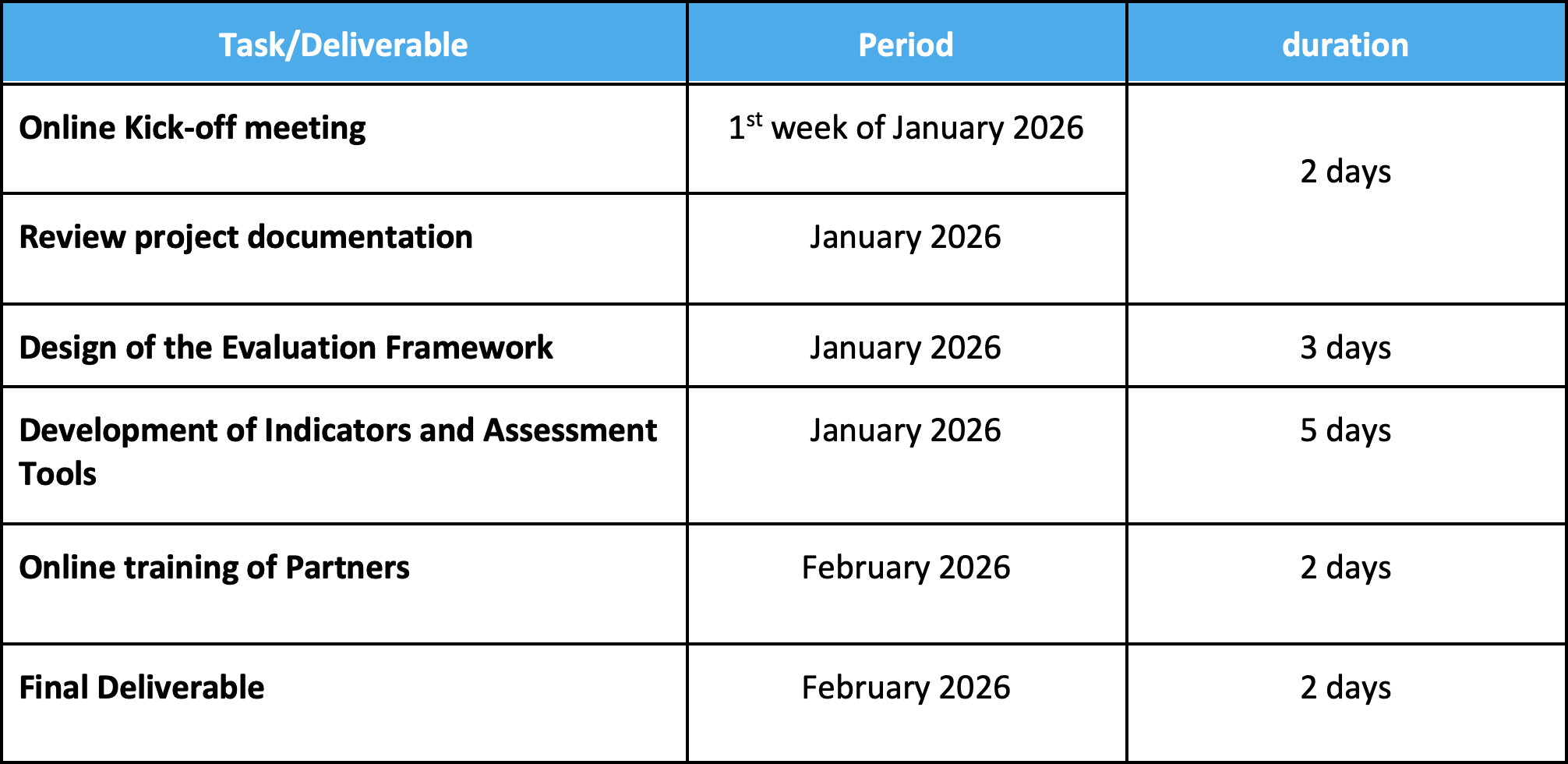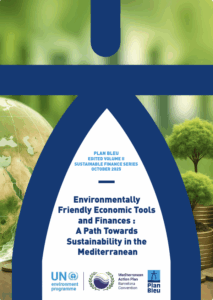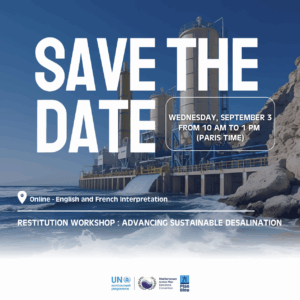1. Context and objectives
This consultation is published by Plan Bleu, Regional Activity Center of the Mediterranean Action Plan (MAP), established in the form of a French association in Marseille, France. The MAP is one of the main components of the Regional Seas Programme of the United Nations Environment Programme (UNEP). It has a legal instrument: the Barcelona Convention and relies on six regional activity centres (“RACs”) responsible in particular for promoting the implementation of the various protocols attached to the convention. Plan Bleu is one of the six centres mandated by the twenty-one countries Parties to the Barcelona Convention and the European Union (Contracting Parties to the Barcelona Convention). Plan Bleu acts as an observatory of the environment and sustainable development in the Mediterranean, and conducts thematic, systemic and prospective analyses to enlighten decision-makers of the region on the environmental risks and the challenges of sustainable development.
INCORE MED is an Interreg Euro-Med transnational project that promotes coastal climate adaptation based on nature-based solutions and democratic innovation. It aims to strengthen the capacity of public authorities and civil society to integrate participatory approaches into coastal and marine planning processes. Operating in 4 pilot sites in Portugal, Spain, Italy, and Croatia, INCORE-MED implements inclusive tools and methodologies to prevent social conflict and empower coastal communities to become more resilient and engaged in ecosystem protection.
The project tackles the shared challenge of low public participation in Integrated Coastal Zone Management (ICZM) and Maritime Spatial Planning (MSP), which limits the effectiveness of climate adaptation. INCORE-MED focuses on empowering citizens to become active agents of change and integrating their voices into environmental governance through ecosystem-based approaches, climate justice, and participatory democracy. Two participatory tools will be implemented and tested during the project, the Democracy Labs (DLabs) and the Scenario Workshops and Adaptation Pathways tool (SWAP).
Democracy Labs (DLabs) are defined as co-creation citizen-centred meta-democracy activities and processes for developing (inclusive) democratic innovations, through which citizens, stakeholders and policymakers work to achieve collective ideas about democratic innovations. DLABS will be adapted and tested to co-design inclusive management solutions. They follow a three-stage approach, starting with a sensitising process, followed by a collective critical assessment and an ideation stage to work towards the development of principles of interactive and inclusive democratic innovations. During the DLab, participants will be oriented on the concepts of climate change adaptation, risk prevention, and nature-based solutions. The DLab focuses on deliberation and inclusivity.
The SWAP combines Scenario Workshops with Adaptation Pathways to create dynamic climate adaptation plans for specific territories. Firstly, stakeholders create their shared vision for the territory (informed by expert knowledge on climate change scenarios) and describe it through visualisation techniques; followed by a multicriteria and cost-benefit analysis of adaptation measures, including NBS, is presented to stakeholders with potential adaptation pathways and a pre-identification of the most realistic pathways, while accounting for uncertainty (i.e., alternative pathways). The result is an adaptation pathway strategy for medium to long-term climate adaptation policy to be integrated into ICZM and MSP.
These tools are deployed to: 1) create and update participatory cartographies and climate risk perception maps; 2) integrate co-design solutions in local action plans; 3) disseminate the methodology to new territories through methodological insights and online courses.
2. INCORE-MED Project – Activity Description
The consultancy will inform the following activity and deliverable:
Activity 2.4 : Analysis of participatory processes for Inclusive NBS and climate adaptation pathways within coastal and maritime planning domains and management domains, such as ICZM & MSP.
The implementation of SWAPs and DLABs as technical democracy tools will be assessed in the pilot area and in comparative terms to learn from their implementation and to define feedback loops into the final methodological product output. This joint assessment will be based on criteria transferred from past projects (INCITE-DEM, BASE, INCCA) to evaluate the participatory processes. DLABS will emphasise the design of inclusive mechanisms that ensure the engagement of civil society in the design of climate adaptation and conservation actions. This posterior analysis will provide data for the result amplification strategy and the second joint assessment process, a joint analysis on the Integration of participatory outputs into actionable adaptation strategies within ICZM & MSP.
Deliverable 2.4.1.: Joint Assessment of SWAP & DLABS participatory processes and NBS & democratic innovations foreseen – Assessment of SWAP and DLABS implementation across pilot sites evaluating their effectiveness in fostering solutions and democratic innovations. Synthesizes outcomes, lessons learned, and recommendations to support integration into ICZM/MSP frameworks within Euro-Med contexts (2025).
3. Mission’s objective
The main objective of the mission is to develop a methodology to assess the implementation of SWAP and DLABs across pilot sites, evaluating their effectiveness in fostering climate adaptation and conservation actions, and democratic innovations. The assessment will also enable comparative learning across sites and help establish feedback loops feeding into the final methodological product.
The consultant will contribute to the overall Activity 2.4 of the INCORE-MED Project, working in close collaboration with Plan Bleu, EcoUnion and Tallinn University, and the project partners.
4. Task description
The consultant will support the development and implementation of a methodology to assess the implementation of SWAP and DLAB across pilot sites.
The objective is to evaluate their effectiveness and inclusiveness in terms of developing co-designing climate adaptation and conservation actions or/and democratic innovation.
- Review project documentation
- Review available project documentation of previous projects related to SWAPs and DLABs, including INCCA, INCITE DEM, BASE project, and literature review related to SWAP and DLABS implementation and evaluation of cases.
- Design of the Monitoring Framework adapted for SWAPs and DLABs
-
- Develop a coherent framework for assessing the effectiveness and quality of both, SWAPs and DLABs implementation, with adapted indicators for each methodology.
-
- The framework will be structured around core analytical axes, including:
-
-
- Facilitation: expertise, capacity to engage, participants’ satisfaction, …
- Stakeholder engagement & Inclusiveness: diversity of actors, knowledge integration, and equity of participation;
- Participatory learning and influence: translation of participatory insights into adaptation or conservation needs; scenarios, and strategic outputs;
- Implementation experience: common challenges and enabling factors from implementers’ perspectives as well as on to what extent lock-in factors have been integrated (development choices, …).
-
Other core analytical axes may be added or suggested by the consultant.
- For SWAPs, the assessment will also focus on scientific/technical assumptions and criteria for selecting, evaluating measures and tipping points, and on the translation of participatory inputs into this process along the pathway design, apart from the analysis of the inclusiveness and engagement process
-
- Objectives: how they were selected and what do they respond to (short- and long-term adaptation needs)
- Pathway design method (the integration of drivers and interests (sectoral, short-/long-term); to what extent symptoms-causes-effects are integrated; the use of quantitative/qualitative approaches – data gaps and modelling limits, metrics and assumptions- thresholds design, uncertainty);
- Consent-making behind the sequencing of measures forming specific pathways in terms of flexibility, reversibility, robustness, “low regrets”.
- Transparency and collaborative learning: to what extent the final output and the pathway visualisation is instructive for others to understand the process, particularly those who are expected to implement them (national and local administrations) or monitor them (stakeholders); to what extent the knowledge transferred was instructive for participants.
- Integration of monitoring and evaluation after the process: to what extent it is foreseen and planned to inform adjustments and execution.
- For DLABs, based on INCITE DEM criteria and indicators for inclusive participation and engagement, the focus will be on the following point :
-
- Inclusivity and fairness
- Empowerment
- Citizen control
- Political inclusion
- Normative standard
- Influencing factors for the democratic quality of participatory processes : transparency, dialogue intensity, cooperative atmosphere and resources
- Define guiding questions and criteria for each axis.
- Development of Monitoring Tools
- Propose a set of measurable indicators (qualitative and quantitative) to be applied by Implementers and adapted to SWAP and DLABs.
- Design practical tools and templates for their monitoring (e.g. self-assessment grid, interview guide, questionnaires, scoring or mapping system).
- Ensure tools are user-friendly, adaptable, and feasible within pilot partners’ capacities.
- Training of partners
- Organise an online training for the Partners to apply the tool.
- Integrate feedback from partners to refine the proposed approach.
Expected deliverable: a Methodological toolkit including:
- The evaluation framework and indicators;
- The proposed tools and templates, in English and in editable format.
- Online training and practical guidance for implementation by pilot teams.
5. Overview of Deliverables
The consultant will be responsible for preparing the following deliverables, in close collaboration with the INCORE-MED Project Manager at Plan Bleu. The consultant will be fully briefed on the INCORE-MED project’s status, ongoing activities and publications by the latter upon recruitment, and will receive a list of resources to support her/him throughout the consultancy.

All deliverables are expected to be delivered to Plan Blan in a timely fashion, having been fully proofread, edited and designed by the consultant to a publishable standard. They will comprise a complete and proofread bibliography, and apply a single referencing system throughout all reports. The consultant will use the Interreg INCORE-MED visual identity for the layout of the reports, which will be provided by Plan Bleu. This is a precondition for the consultancy deliverables and payments to be validated by Plan Bleu.
6. Work assessment
The Consultant will be supervised by Plan Bleu.
- Alice Wittevrongel, Biodiversity Project Officer, [email protected]
- Insa Behrens, Climate change adaptation Project Officer, [email protected]
Regular exchanges will be organized with Plan Bleu and project partners, either through coordination meetings or ad hoc discussions, to ensure alignment and continuous collaboration throughout the assignment.
7. Budget
The available budget for this consultancy is 7 000 euros VAT included and proposals should not exceed this amount.
8. Profile Requirements
- Master’s degree or above in environmental governance, or social sciences.
- Proven experience (at least 5 years) in developing and applying evaluation or assessment methodologies in the context of participatory governance, environmental management.
- Demonstrated experience in designing indicators, participatory monitoring frameworks, or evaluation tools combining qualitative and quantitative dimensions.
- Good knowledge of SWAPs and/or Democracy Labs methodologies is an asset.
- Experience with multi-actor governance processes, co-creation approaches, and democratic innovation mechanisms.
- Previous experience in Mediterranean or EU-funded cooperation projects would be a strong asset.
- Fluency in English.
9. Contractual and Financial Terms
This consultancy will run from the date of the contract signature by both parties to 26/02/2026. Potential travel and accommodation costs related to this mission will be covered separately by Plan Bleu and should not be included in the contract amount. Funding for these activities is secured through both EU-Interreg funding and co-financing from Plan Bleu.
The acceptance of the selected offer implies acceptance of the terms and detailed schedules outlined in these Terms of Reference, including the following payment schedule (negotiable) :
- 30% of the contract amount will be paid upon signature of the contract
- 70% of the contract amount will be paid upon validation of the final deliverable
A properly issued invoice will be required for the scheduled payments, containing the following mandatory details:
- Full name + address of the service provider
- SIRET number (France) or tax number (for non-France)
- Invoice issuance date
- Invoice number
- Service description (e.g., name of the deliverable)
- Amount excluding taxes (HT), VAT, and total amount (TTC), in the currency specified in the contract
- For individuals not subject to VAT (France): include the mention “TVA non applicable, article 293B du code général des impôts”
- Payment due date
The payment term for invoices will be as follows: bank transfer within 15 days after the invoice date.
The tax legislation in force at the time of acceptance of the offer will apply.
10. How to apply
This consultation can be carried out by an individual consultant or by a team of consultants. The selection of the proposal will be carried out based on the submission of a technical offer, a financial offer (including VAT, if applicable), as well as a cover letter and a CV.
Applications must be submitted no later than 14th December 2025 through the Plan Bleu website: www.planbleu.org and by e-mail to: [email protected] & [email protected].
For more information about this consultancy, please contact Alice Wittevrongel and Insa Behrens.












